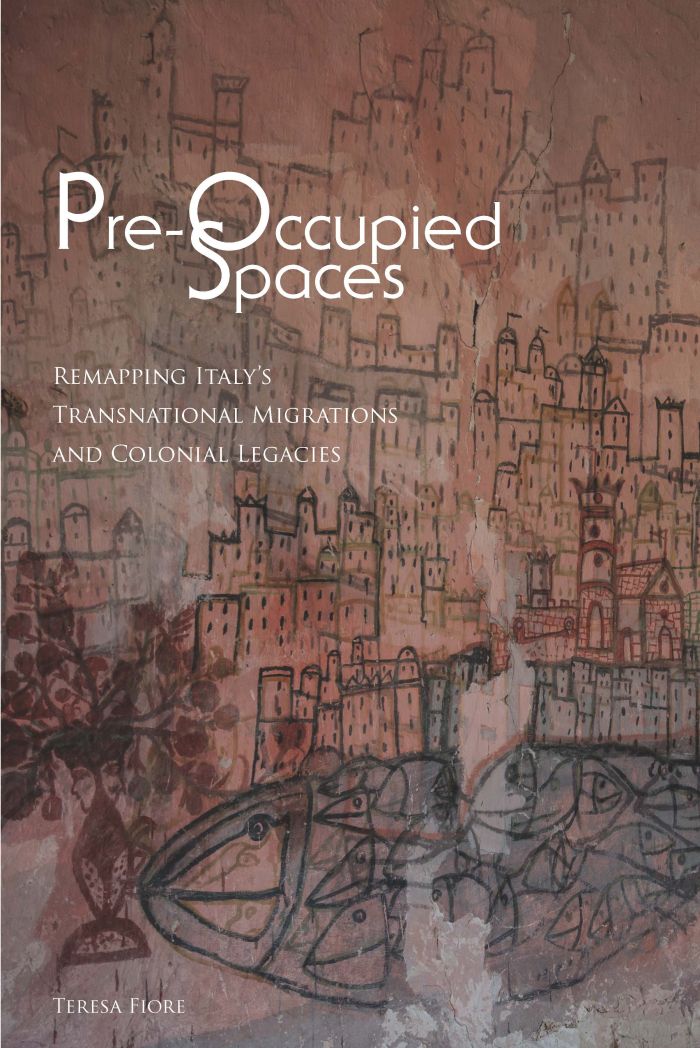Pre-Occupied Spaces
Remapping Italy's Transnational Migrations and Colonial Legacies

This book can be opened with

Runner Up Winner of the Edinburgh Gadda Prize - Established Scholars, Cultural Studies Category
Winner of the American Association for Italian Studies Book Prize (20th & 21st Centuries)
Honorable Mention for the Howard R. Marraro Prize
By linking Italy’s long history of emigration to all continents in the world, contemporary transnational migrations directed toward it, as well as the country’s colonial legacies, Fiore’s book poses Italy as a unique laboratory to rethink national belonging at large in our era of massive demographic mobility. Through an interdisciplinary cultural approach, the book finds traces of globalization in a past that may hold interesting lessons about inclusiveness for the present.
Fiore rethinks Italy’s formation and development on a transnational map through cultural analysis of travel, living, and work spaces as depicted in literary, filmic, and musical texts. By demonstrating how immigration in Italy today is preoccupied by its past emigration and colonialism, the book stresses commonalities and dispels preoccupations.
Fiore's book is a marvelous read. Glowing with humanity, she wears her knowledge lightly. In this book the study of contemporary, post-colonial Italy is filtered through the centuries of the Italian migrant experience. Thus much used terms such as 'diasporic', 'hybridity' and 'liminal' are given human faces. A mastery of the theoretical literature on space, place and the immigrant/emigrant experience is joined by a fascinating analysis of novels, films, social reportage and nursery rhymes in order to bring to life the 'pre-occupation' of the formative experience of the Italian diaspora for modern Italy and the 'preoccupation' of today's Italy where the previous invisibility of the 'New Italians', the sons and daughters of the global migrations of the late twentieth and early twentieth centuries, are reshaping notions of citizenship and belonging. Highly recommended.—Carl Levy, Goldsmiths, University of London
A sophisticated and brilliant work of theoretical scaffolding, one that never loses sight of the perils of its own iconoclastic undertaking. Pre-Occupied Spaces’ extremely well-crafted structure helps the reader navigate from one text to the other, while the theoretical architecture of the book guides the reader through the impressive proliferation of well-researched texts and critical references.—Cristina Lombardi-Diop, Loyola University Chicago
Teresa Fiore reminds readers that Italy is a country that has long been defined by 'border crossing, movements, displacements and differences,' Its 'emigrants' and 'immigrants' have sparked similarly troubled preoccupations wherever, whenever and in whatever direction they have moved. Using the tools of cultural analysis, Fiore offers a stunning analysis of the boats, houses, and workplaces where nations have repeatedly imagined both themselves and their others, usually through futile efforts to culturally and permanently affix people to particular places.—Donna R. Gabaccia, University of Toronto
Teresa Fiore’s Pre-Occupied Spaces: Remapping Italy’s Transnational Migrations and Colonial Legacies successfully integrates three legacies of migrations that are more often treated separately: the traces of Italy’s history of emigration, immigration, and colonialism.—Annali di Italianistica
Fiore invites her readers to reread Italy’s history (and its present) of emigration and its present (and its history) of immigration in light of ongoing debates about citizenship and nationality. As the 2018 elections revealed, this is more necessary than ever.—H-Net Reviews
In placing mobility at the centre of her canvas, Teresa Fiore makes the stories she tells about Italy crucial for our understanding of the contemporary world, its tensions, its fears and its aspirations. Our sense of being in the world today is profoundly shaped by our understanding of the forms taken by mobility and of their effects, of our relationship with space and our interpretations of its (pre)occupations. That is why this is a book which deserves to be read well beyond the confines of Italian Studies – and also a book which reaffirms the role Italian Studies can occupy in the broader field of the Humanities. We need stories like these, voiced this clearly and convincingly, if the Humanities are to maintain their heuristic power and their centrality for our understanding of the contemporary world.—Crossings: Journal of Migration and Culture
Pre-Occupied Spaces is a valuable contribution to a wide potential audience. By incorporating immigration, emigration, and colonialism into a more fluid and contested concept of the Italian nation, Fiore provides an important addition to a very recent and growing scholarship that seeks to redefine Italian identity from new transnational perspectives.—Journal of Modern Italian Studies
Through the analysis of a plethora of texts, some of which are unknown or little-known to the general public, and by virtue of the methodology employed, Pre-Occupied Spaces constitutes a groundbreaking work that makes an invaluable contribution to the analysis of nation formation in Italy through the transnational practices of migration in the past and at present.—Italian American Review
Preface
Introduction. All at One Point: The Un/likely Connections between Italy’s Emigration, Immigration, and (Post-)Colonialism
Part I. Waters: Migrant Voyages and Ships from/to Italy
Aperture I: An Osean of Pre-occupation and Possibilities: The Show L’orda
1. Crossing the Atlantic to Meet the Nation: The Emigration Ship in Mignonette’s Songs and Crialese’s Nuovomondo
2. Overlapping Mediterranean Routes in Marra’s Sailing Home, Ragusa’s The Skin Between Us, and Tekle’s Libera
Part II. Houses: Multi-Ethnic Residential Spaces as Living Archives of Pre-occupation and Invention
Aperture II. A Multi-Cultural Project in a National Square: The Orchestra of Piazza Vittorio
3. Displaced Italies and Immigrant “Delinquent” Spaces in Pariani’s Argentinian Conventillos and Lakhous’ Roman Palazzo
4. Writing the Pasta Factory and the Boarding House as Trans-National Homes: Public and Private Acts in Melliti’s Pantanella and Mazzucco’s Life
Part III. Workplaces: A Creative Re-occupation of Labor Spaces against Exploitation
Aperture III. Labor on the Move: Rodari’s Construction Workers and Kuruvilla’s Babysitter
5. Edification between Nation and Migration in Cavanna’s Les Ritals and Adascalitei’s “Il giorno di San Nicola”
6: The Circular Routes of Colonial and Post-Colonial Homecare: Però’s and Ciaravino’s Alexandria and Ghermandi’s “The Story of Woizero Bekelech and Signor Antonio”
Conclusions. Italy as an Imagi-Nation Laboratory: The Citizenship Law between In and Outbound Flows
Notes
Works Cited
Index

